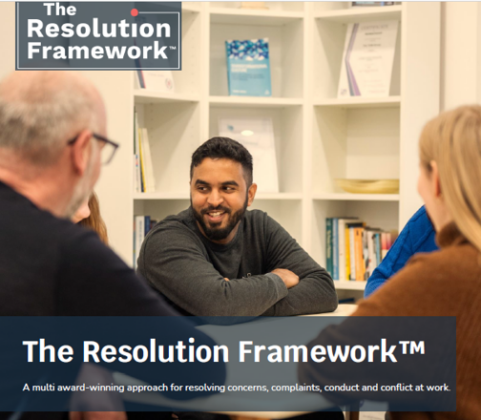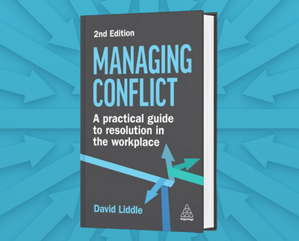What does Formal Resolution involve?
A formal approach should be considered as an option for the most complex and serious issues ie situations which achieve a high score using TCM’s innovative Resolution Index™. These may include allegations of bullying, harassment, discrimination, fraud and gross misconduct. The four boxes below highlight a key stage in the formal resolution stage of The Resolution Framework™. For additional details relating to each stage, please use the short enquiry form at the bottom of this page and we will be in touch.
Following the resolution triage assessment, the Resolution Index™ may have identified sensitive/complex issues. In these cases, an investigation may be needed prior to the formal resolution meeting.
TCM delivers fully accredited investigation skills training to three levels:
- Core Investigations Skills™. For managers and people professional who need to understand the fundamental elements of an investigation. Duration = one day
- Practical Investigation Skills™. Designed for managers and people professionals who are required to undertake investigations into allegations such as bullying, harassment, discrimination and misconduct. Duration = two days.
- Advanced Investigation Skills™. An advanced course for investigators who are a required to investigate serious and complex allegations of fraud, serious misconduct and fitness to practice etc. Duration = three days (or longer as required)
Our sister site The Investigation Company offers additional resources.
When handling serious misconduct allegations, understanding proper suspension protocols is crucial for HR leaders and managers. The Resolution Framework™ aligns with Acas Code requirements and provides essential guidance for managing suspensions effectively and fairly. Key principles include exploring alternatives first, ensuring multi-person decision-making to prevent bias, maintaining clear documentation, and providing comprehensive wellbeing support throughout the suspension period.
Remember that suspension should always be a last resort, not a punishment, and should be kept as brief as possible. Every suspension case must be handled with care, maintaining regular communication with the suspended employee and ensuring they have access to appropriate emotional and psychological support services. For guidance on implementing suspension procedures, contact your Resolution Centre before taking action.
Say goodbye to adversarial workplace ‘hearings’. Modern organisations are embracing ‘formal resolution meetings’—a progressive approach that promotes adult-to-adult dialogue and focuses on achieving positive outcomes. This transformation, backed by over two decades of research, creates more constructive workplace relationships and sustainable solutions to complex conflicts.
Our Resolution Framework™ ensures these meetings are conducted fairly and effectively, with independent chairs appointed through the Resolution Centre. While the process maintains traditional elements like employee accompaniment rights and appeals, it prioritises restorative approaches including mediation, coaching support, and structured warnings.
For serious cases, chairs retain the authority to implement appropriate sanctions, including dismissal, all clearly outlined within our comprehensive framework. Ready to modernise your conflict resolution process?
We provide comprehensive training for appeal chairs, equipping them with the skills needed to handle complex workplace situations effectively.
Take your resolution process further with our innovative case review system. Through regular analysis by your Resolution Centre, each case becomes a valuable learning opportunity, driving cultural transformation and continuous improvement across your organisation. This systematic approach not only resolves immediate issues but builds a powerful ‘corporate memory’ that shapes lasting positive change.

We wanted to remove, where possible, the stress, length of time, challenges and detrimental impact that the grievance process can have on all individuals involved. Our Resolution Framework offers a supportive and proactive approach for resolving workplace issues. Overall, we’ve found it makes sense commercially by saving time and it’s had positive effects for employee wellbeing, a win-win.

Have a question?
If you would like to know more about Formal Resolution, or you have a question about any aspect of the Resolution Framework™, please let us know. Complete this short form and we will delighted to assist.






